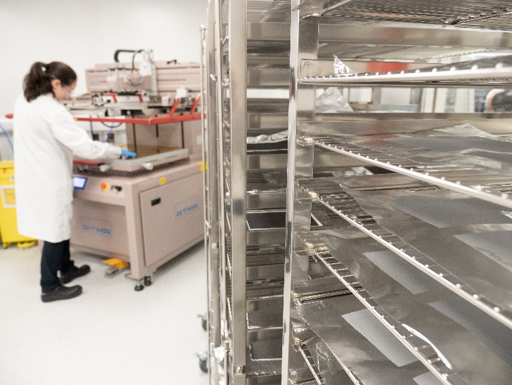Solid State Batteries – Safe in Manufacturing, Safe in Use
Posted on: in Blog
Ilika’s recent £24.7m fundraise is further evidence that the investor community is backing Ilika in its pursuit to design superior batteries using our solid state technology. Solid state batteries (SSB) are sometimes described as the Holy Grail in terms of energy storage and researchers around the world are working hard to turn lab prototypes into multi-cell pouches, high cycle life batteries with the energy and power density theoretically expected from this technology; whilst at the same time planning for scale-up.
Ilika’s journey into SSB started over ten years ago when we collaborated with Toyota on early work on solid electrolytes. We then developed our own IP and launched a design and manufacturing program, Stereax, for micro-SSB, mm-scale and mAh-level cells for implanted medical devices and IoT sensors. The Stereax manufacturing process is more comparable to compound semi-conductor than conventional lithium ion battery processes: it involves evaporation and sputtering on glass wafers and is not scalable beyond the mAh-level.

Our Goliath program, commenced in 2018, is based around solid state cell development at Wh-level for electric vehicles and consumer electronics using materials and equipment as close to that of the lithium-ion battery industry as possible. Of course, some are different, such as the solid electrolyte and the way we print the material within our battery structure. One material in common between Stereax and Goliath is the silicon anode. As mentioned above, the processes are completely different, but we have learned about the safety and predictability aspects of silicon, which is at the basis of our technology choices: aiming to create SSBs that are safe in manufacturing and safe in use. Managing the well-known volume expansion of silicon upon charging/discharging (the battery “breathing”), is one of the key challenges in development. The alternative anode, lithium, may well be more efficient and powerful in the future but the elimination of “short-circuit” dendrites needs to be reliably evidenced in the long-term.
We also selected oxides as our electrolyte of choice, again because of the expected superior safety aspect of the material, as opposed to sulfur-based electrolytes which are extremely reactive with moisture. Moreover, we are focusing on developing fully solid batteries, as opposed to semi-solid versions which include non-solid (polymer, liquid) components, because we expect the benefits of all-solid-state structures to be superior to other choices in the long term.
At Ilika, we are developing a technology with great attributes for the next generation of electric vehicles and other transportation sectors, whilst also being attractive to selected consumer electronics markets. The SSB technology could provide up to twice the range compared to current electric vehicles and a rapid charge down to 15 min, enabling light weighting and a safe driving experience without the use of non-flammable components.
If you like to learn more about the Goliath technology please contact us info@lika.com.
